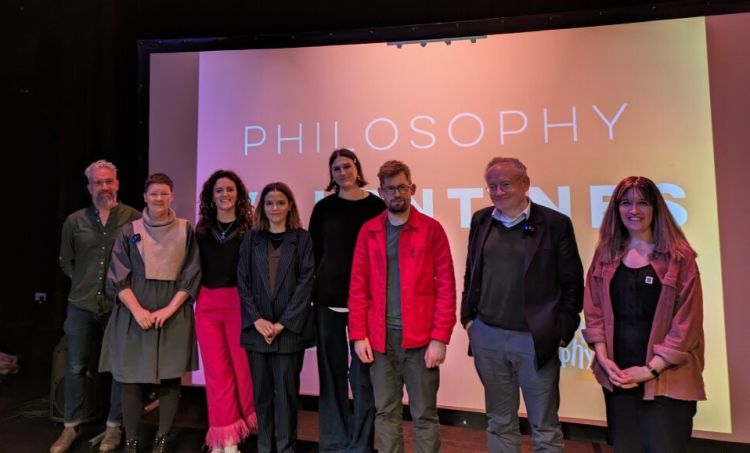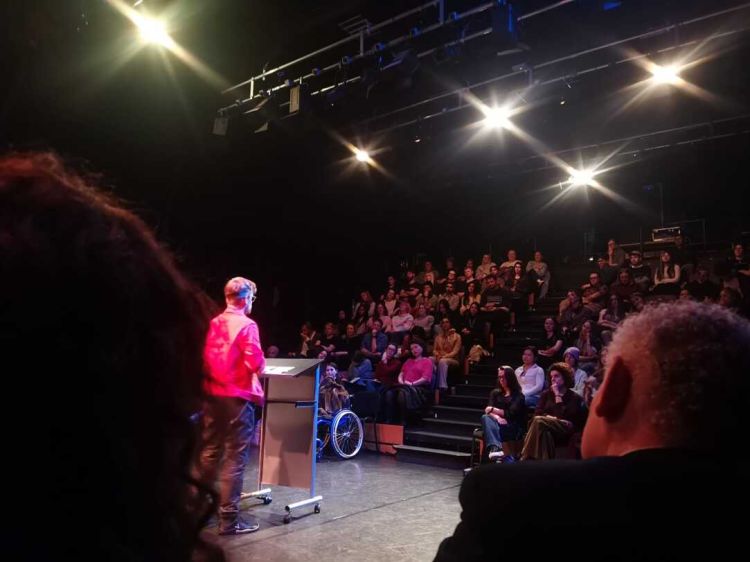Love, sex and relationships explored by AHC philosophers at sold-out Valentine's Day event

Love, sex and relationships explored by AHC philosophers at sold-out Valentine's Day event
Relationship anarchy, unrequited love, sexual deception and the problems with dating apps were just a few of the many subjects tackled this week at a special sold-out event for Valentine’s Day featuring philosophers from the Faculty of Arts, Humanities & Cultures.
Presented by the University of Leeds’ Centre for Love, Sex and Relationships, Philosophy Valentines brought together researchers from the School of Philosophy, Religion and History of Science to explore a range of themes.

Researchers from the School of Philosophy, Religion and History of Science join forces for Philosophy Valentines
Sexual deception
Dr Danielle Bromwich explored sexual deception, asking what kind of deception would disqualify sexual consent. Using the example of a medical procedure, Dr Bromwich argued that benevolent lies by a doctor could invalidate informed consent to a medical procedure, and questioned where the line should be when a person lies about their interests to persuade someone to have sex with them.
As humans, we are even more disposed to exaggeration when sex is on the table. Everyone lies about their interests on dating apps – there's a lot of hikers out there!
Dating apps
Dr Luke Brunning addressed ethical concerns around dating apps, which include safety issues, ‘ghosting’ and gamification – where apps are made to feel like addictive games to encourage users to stay on the platform.
Apps are accelerating cultural change, fostering behaviour like ghosting, lying and breadcrumbing. Rich and nuanced characteristics of individuals are squashed down into a few images and lines of text on dating apps, which can be damaging.
Relationship anarchy
Speaking about the concept of relationship anarchy, Dr Natasha McKeever highlighted the view that relationships do not need to be categorised into a hierarchy of friendships and romances.
It is a way of relating to others without having power over them, rejecting monogamy and exclusivity rules.

Dr Luke Brunning addresses the audience
Amatonormativity, unrequited love and straight women’s preference for tall men
Sophie Goddard examined amatonormativity – the idea that romantic, exclusive relationships should be at the centre of our lives. Sophie argued that this undermines other non-romantic caring relationships such as friendships and that people who prioritise non-romantic relationships are also excluded from benefits and privileges through marriage. Professor Gerald Lang claimed that unrequited love does not qualify as love because there needs to be “two-way traffic”, and Isobel Logan, Leeds University Philosophy Society’s Academic Rep, tackled the idea that straight women prefer taller men.
Dr Brunning and Dr McKeever also featured on BBC Radio Leeds this week, speaking to Steve Bailey (42 mins) about their work. This followed publication of a widely-read piece in the Conversation. For more information about Dr Brunning and Dr McKeever’s research, visit https://ethicaldatingonline.com/




